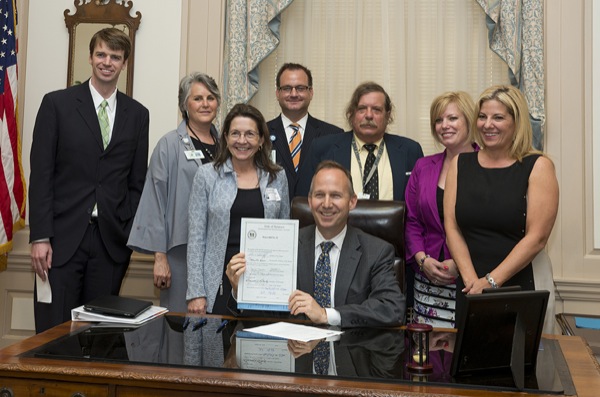


Liability limits lifted
Policy internship at DNREC leads to new oil spill legislation for Delaware
3:44 p.m., June 12, 2013--Nearly 42 million gallons of crude oil move through the Delaware River and Bay each day, carried by approximately 3,000 deep-draft vessels a year and off-loaded at the nation’s largest receiving port for very large tanker ships.
At this level of traffic, an occasional oil spill is virtually inevitable, even with the best safety practices in place. Large spills such as the Mystras spill (20,000 gallons) in 1997 and the Athos I spill (265,000 gallons) in 2004 have previously soiled Delaware shores.
People Stories
'Resilience Engineering'
Reviresco June run
Now, thanks to the work of a University of Delaware graduate student intern whose position was co-sponsored by the Delaware Environmental Institute (DENIN) and the Delaware Department of Natural Resources and Environmental Control (DNREC), state taxpayers are protected from footing most of the bill for cleaning up catastrophic oils spills that affect the coastline.
With the nearly unanimous passage of House Bill 32, signed into law by Gov. Jack Markell on June 6, Delaware has removed outdated oil spill liability limits that would have left the state holding the bag for most cleanup expenses. The legislation was based on research conducted in the summer of 2011 by public policy intern Tom Battagliese.
Battagliese, a grad student in UD’s Center for Energy and Environmental Policy at the time, was one of the first two students in a newly established internship program. The program was designed to provide real-world policy-making experience to students with environmental interests. DNREC staff identified projects and mentors for the interns, while DENIN staff recruited qualified students and the Delaware EPSCoR program provided funding.
Battagliese worked with Greg DeCowsky in DNREC’s Division of Waste and Hazardous Substances Site Investigation and Restoration Section to examine Delaware’s standing oil spill liability limits. The limits had been established in 1977 with the passage of the Oil Spill Pollution Act, which placed a cap on the amount a shipping, drilling or refining company was responsible for in the event of a spill. That amount was well below the federal limit and had not been adjusted for inflation since.
For example, the 1977 law limited a company’s liability for spills from an oil tanker or barge to $300 per gross ton or $250,000, whichever was greater, up to a maximum of $40 million. In contrast, the total costs for cleanup, damages, penalties and lawsuit settlements for the 2010 Deepwater Horizon oil spill in the Gulf of Mexico have topped $40 billion.
Battagliese completed a detailed analysis of Delaware’s regulations in comparison with federal liability limits and those of other states. At the end of the summer, he presented his findings and recommendations in written and oral presentations to DNREC’s secretary and senior managers.
With data from the analysis to back them up, DeCowsky and his division colleagues were empowered to pursue legislation to correct the discrepancies Battagliese had identified and protect the state from significant financial exposure in the event of a catastrophic release.
The result was HB 32, introduced in the Delaware House of Representatives in March by primary sponsor and house majority leader Valerie Longhurst, with co-sponsorship by Reps. Earl Jaques and John Kowalko. The bill passed the House unanimously on April 16 and was referred to the Senate, where co-sponsors Nicole Poore and David McBride shepherded the bill to passage by a vote of 20-1 on May 15.
Two of the bill’s sponsors, Longhurst and Poore, were present at a signing ceremony at Markell’s Legislative Hall office in Dover on June 6, as were DNREC Secretary Collin O’Mara, DeCowksy and other DNREC personnel who had a hand in crafting the bill.
“The Delaware River is a precious natural resource. Heaven forbid anything should happen to it, but if it does, at least we’ll be more protected than we have been for the past 36 years,” O’Mara said of the legislation at the ceremony.
DENIN and EPSCoR were represented at the ceremony by associate director Jeanette Miller, who worked closely with DNREC staff to initiate the joint internship program.
“This is a perfect example of how we work together effectively in Delaware, bringing together experienced staff from DNREC with our talented students, and then seeing the work move forward to become better environmental law,” Miller said.
Battagliese was unable to attend the ceremony because he has moved on to full-time employment, working on sustainability initiatives at BASF Corp. in Florham Park, N.J. Prior to pursuing his degree at UD, he had worked in environment, health and crisis management for the petroleum company BP.
“The internship was very interesting for me as I had worked for a number of years assuring compliance, and this was a chance to be on the other side of the fence and better understand policy creation,” Battagliese said. “I did not expect my work to directly lead to policy changes that I had recommended in my final report. That was definitely an exciting outcome.”
The DENIN/DNREC environmental policy internship is now in its third year with one graduate student and three undergraduates at work in DNREC offices this summer.
“This has been a highly successful partnership with DNREC,” Miller said. “We are definitely looking forward to seeing what other positive changes our students can help bring about for the state of Delaware.”
Article by Beth Chajes
Photo by Kathy F. Atkinson









